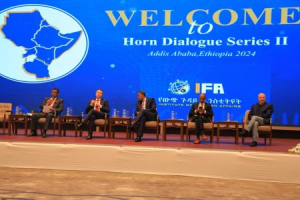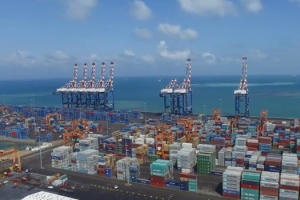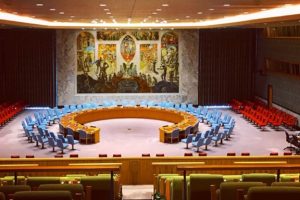
Once considered the darkest and most destitute part of the world, Africa is now being seen as the continent of the future with a growing economy and young population. The youthful continent is becoming an epicenter of investments and trade. In spite of the negative pictures and news of conflicts and poverties, Africa is also presenting itself as a place of opportunity for growth and development.
With vast and untapped natural resources, the continent’s contribution to global development cannot be undermined. The continent that has been tarnished by centuries of wrong narratives is presenting itself as the next powerhouse of the globe. With this comes an increased call for proportional representation of the continent in global institutions. The continental bloc, the African Union has already made the matter a priority.
Current world scenarios are behooving the international community to have an equal say in global international affairs. As political and socioeconomic crises rock the world, thus it has become imperative to change the current international structure in a way that would effectively address current issues. With the globe requiring a decisive and coordinated response, many contend that an equitable and participative international framework is necessary to address the concerns.
Furthermore, it has become clear that the issue of equitable and fair representation within the international bloc is a major injustice echoed by African countries and people from other aisles of the globe as well.
Despite having a population of over 1.4 billion, Africa is not represented in the highest global decision-making bodies, such as United Nations Security Council (UNSC). The continent has demanded equal representation and treatment in the largest arena in the world due to its rapid economic expansion and growing political strength.
For people advocating UN reform, the international blocs including the UNSC should be reorganized to offer everyone equal voice and should accommodate all parts of the world. Furthermore, given the tremendous changes occurring in the world, it is becoming increasingly clear that the international system needs to be reformed. Many believe that the moment has come to repair historical errors and update the worldwide system
Many countries, blocs, and leaders agree that Africa should be a part of this group. It was back in 2023, during the 36th African Union meeting in Addis Ababa that UN Secretary-General Antonio Guterres declared it was just and proper that Africa be granted permanent membership in the UNSC.
Over the years, the issue of equal and fair representation attracted criticism of the Council as many see it as a political tool of the member countries to dictate global geopolitics. United Nations Secretary- General Antonio Guterres described the non-inclusion of Africa in the UNSC permanent seat as a ‘flagrant injustice’.
The quest for Africa’s permanent seat at the UNSC has been a long-standing issue raised by the African Union and its member countries on various global stages. However, the issue has been placed on the back burner and the quest has not received a response to date.
African countries still lack representation and the ability to safeguard their interests at the UNSC for over 70 years, said Ambassador Jorge Catarino Cardoso, a Director of the Africa, Middle East, and Regional Organizations Directorate of the Angolan Ministry of Foreign Affairs.
“Africa has myriads of problems in relation to security and peace, yet discussions on these matters often exclude African nations’ presence and voices, the ambassador told The Ethiopian Herald exclusively.
“Africa is currently represented on the UNSC through the A3, a group of non-permanent members, “he said stressing the need to transform this non-permanency into a permanent feature of the Security Council.
The absence of permanent seats of Africa on the UNSC creates an imbalance. This situation fails to adequately represent the interests of the African people, stated Ambassador Salah S. Hammad, Senior Human Rights Expert of the Department of Political Affairs of AUC.
He elucidated that to address this imbalance, the African Union established the C10, a committee of ten heads of state and government, chaired by the President of Sierra Leone. “The committee’s mandate is to facilitate an African position on the reform of the UNSC, advocating for a minimum of two permanent seats for Africa and an increase in non-permanent seats to five, ensuring representation from each region of Africa in a rotational manner,” he added.
Also, during the 37th Ordinary Session of the Assembly of the Heads of State and Government, the issue of securing Africa’s rightful place in the global arena was high on the agenda where AUC Moussa Faki Mahamat Chairperson emphasized the need for concerted efforts to secure Africa’s representation
Ambassador Salah emphasized the urgent need for change to enable Africa to contribute to building a stable, united, prosperous, and peaceful continent. The ongoing negotiations through the C10 aim to secure Africa’s permanent representation in the Security Council, and the ambassador expressed his eagerness for immediate outcomes in this regard.
Africa has been persistently advocating for a permanent seat in order to ensure that the interests of the largest continent are adequately represented in global decision-making processes.
With Africa increasingly becoming a target of conflicts, militants, and coup d’états activities, having a permanent seat on the UNSC would enable Africa to effectively manage its security and peace, also added Ambassador Jorge
The push for Africa’s representation in global affairs aligns with Agenda 2063, a strategic framework led by the African Union. The AU is committed to ensuring Africa’s comprehensive representation in the international arena, including UN reform. Furthermore, there is a growing intention to assume leadership positions in various UN agencies, as Africa’s voice needs to be heard on global issues, ambassador Salah said.
Ambassador Jorge noted that Africa has initiated the process of securing at least two permanent seats for the continent, aligning with the Ezulwini Consensus, which outlines Africa’s views on how peace and security issues should be addressed at the UN.
Moussa Faki stressed the importance of collaboration among all concerned parties to foster a strong, peaceful, and prosperous Africa. He highlighted that recurring conflicts, often fueled by militants and coup d’états, have hindered Africa’s progress toward a brighter future.
Mentioning the support of the United States, Russia, China, the UK, and France for at least one African permanent member, Guterres expressed hope that a partial reform of the Security Council could correct this injustice and allow Africa to have at least one permanent member.
In an exclusive interview this week, the EU said that it is in favor of the AU’s bid for a proper representation not only in the UNSC but also in all multilateral forums.
EU representative to the AU, Ambassador Javier Nino Perez stated that the European bloc has strongly supported AU’s accession to the G20. It was even engaged in the dialogue with non-European G20 members supporting the African bid. Later, the continent was admitted to the club of 20. This is an example to follow to reform other multilateral institutions like the UNSC.
“We are extremely pleased that AU will sit together with its sister organizations. This reflects the logic of having Africa more meaningfully represented in the international forum,” said the Ambassador.
Accordingly, UNSC, as to the Ambassador, is to be reformed necessitates the consent of the five permanent members where four of whom are not from European nations. “What Africa needs to do is to engage in a dialogue with those five permanent states and with the rest of international communities to reform the security bloc,” he said.
BY EYUEL KIFLU
THE ETHIOPIAN HERALD THURSDAY 29 FEBRUARY 2024





